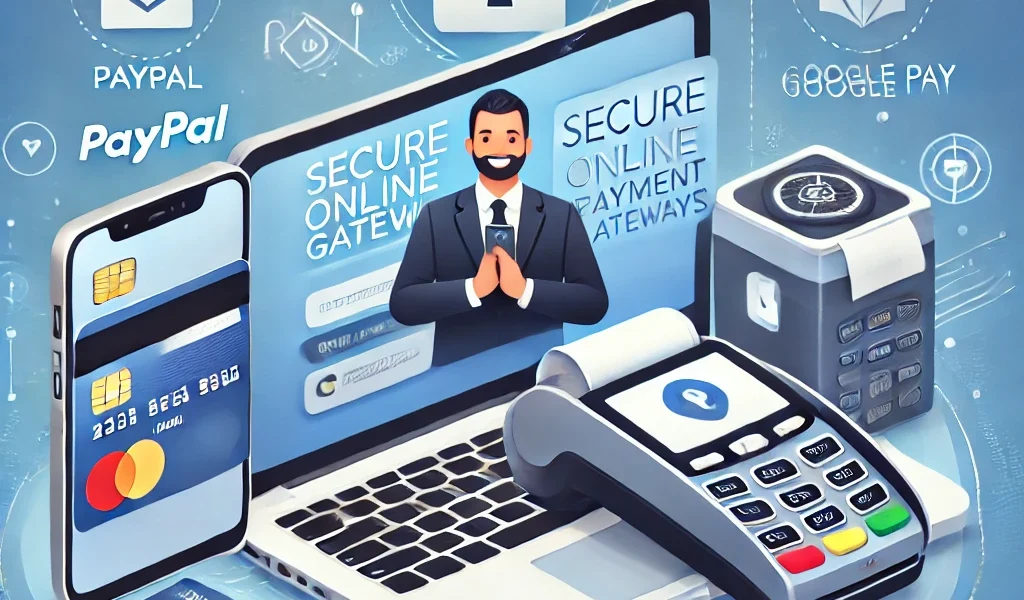Introduction
In today’s digital economy, having a reliable and secure payment gateway is essential for small businesses. Whether you run an online store, a subscription service, or a local business with an e-commerce presence, choosing the right payment gateway can impact your bottom line, customer satisfaction, and security.
This guide explores the best payment gateways for small businesses in 2025, comparing security features, fees, and overall usability to help you make an informed decision.
1. What is a Payment Gateway?
A payment gateway is a service that authorizes and processes online payments for businesses. It acts as a bridge between your website or app and the financial networks that handle transactions. A good payment gateway ensures secure, fast, and seamless transactions.
Key Functions of Payment Gateways: ✔ Encrypting and securely transmitting payment details ✔ Verifying payment information and fraud detection ✔ Processing credit/debit card payments and digital wallets ✔ Providing businesses with transaction reports
2. Factors to Consider When Choosing a Payment Gateway
A. Security and Compliance
- PCI DSS Compliance: Ensures safe handling of cardholder data.
- Fraud Detection Tools: Features like AI-based risk assessment and chargeback prevention.
- Tokenization & Encryption: Protects sensitive financial data.
B. Transaction Fees & Costs
- Per-Transaction Fees: Varies between 1.5% – 3.5% per transaction.
- Setup & Monthly Fees: Some gateways have zero setup fees but may charge monthly costs.
- Chargeback Fees: Additional costs when customers dispute charges.
C. Payment Methods Supported
- Credit/Debit Cards (Visa, Mastercard, Amex)
- Digital Wallets (PayPal, Apple Pay, Google Pay, Amazon Pay)
- Bank Transfers & Buy Now, Pay Later (BNPL) Services
D. Integration and Ease of Use
- API Support: For easy integration with websites and mobile apps.
- E-commerce Platform Compatibility: Works with Shopify, WooCommerce, Magento, etc.
- Recurring Billing Features: Ideal for subscription-based businesses.
3. Best Payment Gateways for Small Businesses in 2025
A. PayPal Business (Best for Global Transactions)
✔ Transaction Fees: 2.9% + $0.30 per transaction (domestic), higher for international payments. ✔ Security: PCI compliance, advanced fraud protection, buyer protection. ✔ Payment Methods: Accepts cards, PayPal balance, PayPal Credit, and BNPL. ✔ Integration: Works with Shopify, WooCommerce, and custom websites.
Best For: Small businesses with global customers and freelancers.
B. Stripe (Best for Developers & Customization)
✔ Transaction Fees: 2.9% + $0.30 per transaction. ✔ Security: Tokenization, AI fraud detection, strong PCI compliance. ✔ Payment Methods: Supports 135+ currencies, Apple Pay, Google Pay, BNPL. ✔ Integration: API-driven, great for developers.
Best For: Tech-savvy businesses and subscription-based services.
C. Square (Best for Brick-and-Mortar & Online Businesses)
✔ Transaction Fees: 2.6% + $0.10 per swipe, 2.9% + $0.30 online. ✔ Security: End-to-end encryption, real-time fraud monitoring. ✔ Payment Methods: Cards, digital wallets, bank transfers. ✔ Integration: POS system, Shopify, and in-person transactions.
Best For: Small retail businesses and restaurants.
D. Authorize.Net (Best for Established Small Businesses)
✔ Transaction Fees: 2.9% + $0.30, plus a $25 monthly fee. ✔ Security: PCI-compliant, fraud protection suite. ✔ Payment Methods: Cards, e-checks, Apple Pay, recurring billing. ✔ Integration: Works with Shopify, WooCommerce, and accounting software.
Best For: Businesses looking for a stable, feature-rich gateway.
E. Adyen (Best for Enterprise-Level Scalability)
✔ Transaction Fees: Varies based on region and volume. ✔ Security: AI-driven fraud protection, 3D Secure authentication. ✔ Payment Methods: Global payments, BNPL, crypto, bank transfers. ✔ Integration: Advanced APIs for global scaling.
Best For: Fast-growing businesses with international customers.
4. Pros & Cons of Using Payment Gateways
Pros:
✅ Enables businesses to accept digital payments seamlessly. ✅ Enhances security with encryption & fraud protection. ✅ Offers analytics and transaction reporting. ✅ Supports multiple payment methods.
Cons:
❌ Transaction fees can reduce profit margins. ❌ Chargeback disputes can be costly. ❌ Some gateways may have complex integration requirements.
5. How to Choose the Right Payment Gateway for Your Business?
✔ Analyze Your Business Model: Are you selling internationally? Do you need recurring billing? ✔ Compare Fees: Look for hidden costs like chargebacks and monthly fees. ✔ Prioritize Security: PCI compliance and fraud detection should be a priority. ✔ Check Integration Support: Ensure it works with your e-commerce or POS system. ✔ Customer Support: 24/7 support is crucial for handling payment issues.
6. Conclusion
Selecting the best payment gateway for your small business depends on your budget, security requirements, and target audience. While PayPal and Stripe are excellent choices for most businesses, solutions like Square and Authorize.Net cater to specific business needs.
Before making a decision, compare transaction fees, security features, and compatibility with your e-commerce platform or POS system.
A well-chosen payment gateway enhances customer experience, reduces transaction risks, and ensures smooth financial operations for your business.
Disclaimer:
This article is for informational purposes only and does not constitute financial or legal advice. Always consult a financial expert before choosing a payment processing solution.




